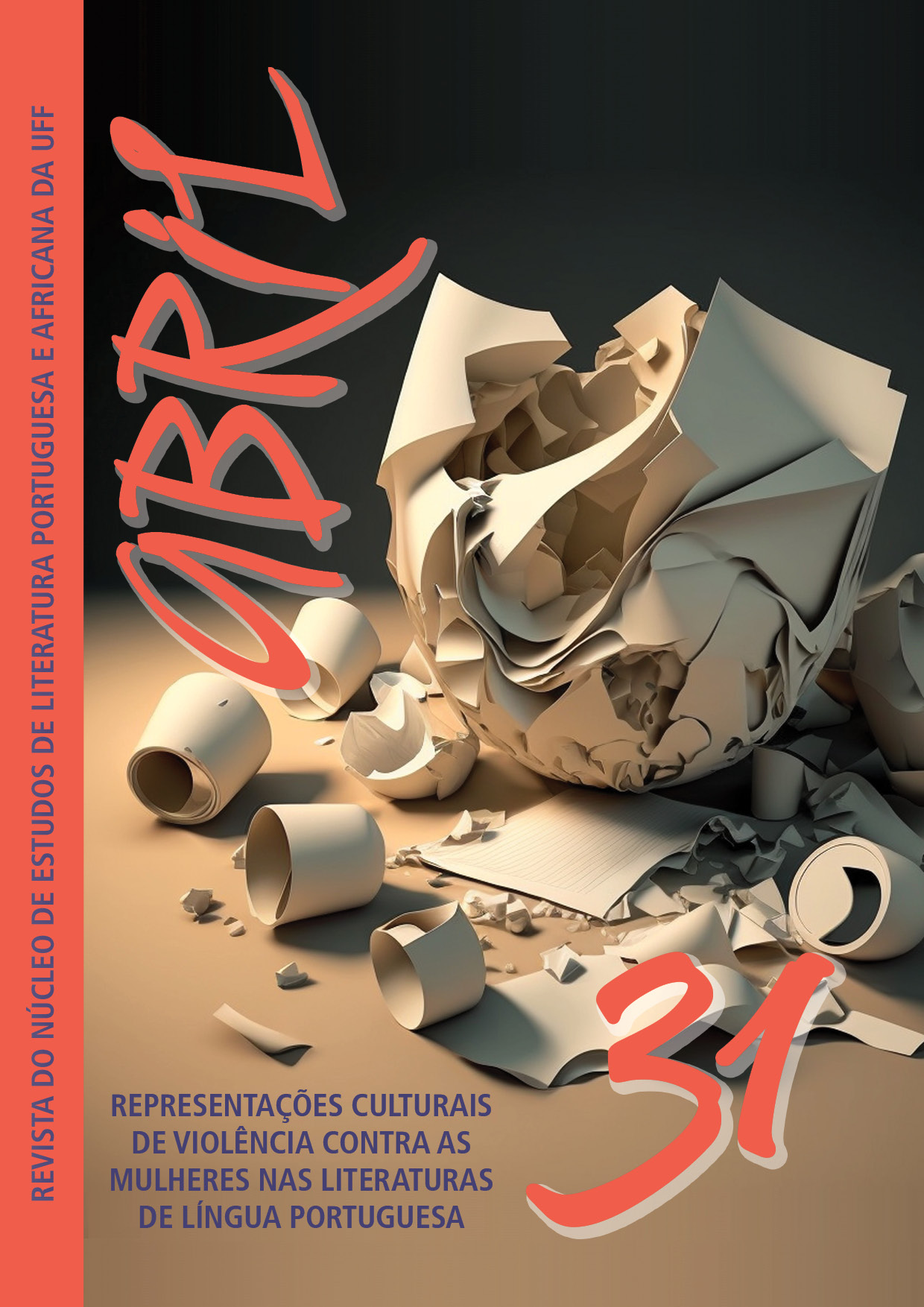“Flores recolhidas”, despite being shattered: an analysis of violence due to the condition of being a woman, through a short story by Lídia Jorge
DOI:
https://doi.org/10.22409/abriluff.v15i31.58678Keywords:
Male Domination, Physical violence, Symbolic violence, Muting, SororityAbstract
This article aims to analyze the represented and denounced forms of violence in the short story As três mulheres sagradas, by Lídia Jorge (2014). In this story, the disarray of abortion practice and a solidarity institution called “Collected Flowers” that seeks to assist future and young mothers come to the forefront. The narrative introduces four significant female characters: Vera, the leader of the association; Julinha Moreira and Dinah, two collaborators; and Margarida, a young woman pregnant from a rape who is taken in and transformed into the institution’s spokesperson. Within the scope of the analysis, we observe representations of both physical and symbolic violence of silencing concerning the characters Vera and Margarida. It is crucial to highlight that Lídia Jorge portrays complex and multifaceted characters that go beyond mere depictions of fragility and passivity. Her works frequently delve into the human condition in all its nuances, encompassing the various ways in which female subjects grapple with their vulnerabilities and find forms of resistance in the face of adversity. To accomplish this, it was necessary to draw upon the theoretical contributions of Derrida (2014), and Todorov (2009) in the field of the relation between fictional and real discourse; Michaud (1989) regarding the concept of violence; Bourdieu (2012) for reflecting on male domination; Butler (2018), and Beauvoir (2009) for considerations about the feminine gender; and Fernandes (2021) in regard to sorority.
Downloads
References
ABREU, Ari Francisco de. Estratégias textuais em Marido e outros contos, de Lídia Jorge. 2010. 78 p. Dissertação, Mestrado em Letras. Pontifícia Universidade Católica de Minas Gerais, Belo Horizonte, 2010. Disponível em: <http://www.dominiopublico.gov.br/pesquisa/DetalheObraForm.do?select_action=&co_obra=172078>. Acesso em 18 de maio de 2023.
BEAUVOIR, Simone de. O segundo sexo. v. 2. A experiência vivida. Tradução de Sérgio Milliet Rio de Janeiro: Nova Fronteira, 2009.
BOURDIEU, Pierre. A dominação masculina. Tradução: Maria Helena Kühner. 11. Ed. Rio de Janeiro: Bertrand Brasil, 2012.
BRAH, Avta. Diferença, diversidade, diferenciação. Cadernos Pagu, n. 26, jan./jul. de 2006, p. 329- 376. Disponível em: <https://www.scielo.br/j/cpa/a/B33FqnvYyTPDGwK8SxCPmhy/?format=pdf&lang=pt>. Acesso em 15 de fevereiro de 2023.
BUTLER, J. Problemas de Gênero. Feminismo e subversão da identidade. Tradução de Renato Aguiar. Rio de Janeiro: Civilização Brasileira, 2018.
CHEVALIER, J.; GHEERBRANT, A. Dictionnaire des symboles. Paris: Editions Robert Laffont, 1998.
DERRIDA, Jacques. Essa estranha instituição chamada literatura. Tradução de Dias Esqueda. Belo Horizonte: Editora UFMG, 2014.
FERNANDES, Evelyn Blaut. Morte ao patriarcado: fraternidade, irmandade, sororidade. Cadernos Pagu, n. 63, 2021. Disponível em: <https://www.scielo.br/j/cpa/a/kzKGbt3svhfMHF96CNrVSnJ/?lang=pt>. Acesso em 22 de maio de 2023.
FOUCAULT, Michel. A ordem do discurso: a aula Inaugural no Collège de France. Tradução de Fraga de Almeida Sampaio. 24 ed. São Paulo: edições Loyola, 2014.
JORGE, Lídia. As três mulheres sagradas. In: JORGE, Lídia. Antologia de contos. Marlise Vaz Bridi (Org.). São Paulo: Leya, 2014.
KRUG, E. G; (et al). Relatório mundial sobre violência e saúde. Organização Mundial da Saúde. Genebra, 2002. Disponível em: <https://portaldeboaspraticas.iff.fiocruz.br/wp-content/uploads/2019/04/14142032-relatorio-mundial-sobre-violencia-e-saude.pdf> acesso em 14 de maio de 2023.
LARANJA MECÂNICA. Direção de Stanley Kubrick. Inglaterra: Hawk, Polaris, Warner Bros, 1971, 137 minutos. Cor.
MACHADO, Eliane Aparecida. Entre tensão e fruição: estado de imanência nos contos de Lídia Jorge. 2020. 131 f. Tese, Doutorado em Letras. Universidade Presbiteriana Mackenzie, São Paulo, 2020. Disponível em: <https://dspace.mackenzie.br/handle/10899/27861>. Acesso em: 08 de março de 2023.
MACHADO, Lia Zanotta. Masculinidade, sexualidade e estupro: as construções da virilidade. Cadernos Pagu, Campinas, n. 11, p. 231-273, 1998. Disponível em:<https://periodicos.sbu.unicamp.br/ojs/index.php/cadpagu/article/view/8634634> Acesso em 15 de fevereiro de 2023.
MICHAUD, Yves. A violência. Tradução de L. Gracia. Coleção Princípios e Fundamentos. São Paulo: Editora Ática; 1989.
RILKE, Rainer Maria. Soneto a Orfeu; Elegias de Duíno. Trad. Emmanuel Carneiro Leão. Petrópolis: Vozes, 1989.
TODOROV, Tzvetan. A literatura em perigo. Tradução: Caio Meira. Rio de Janeiro, DIFEL, 2009.
Downloads
Published
How to Cite
Issue
Section
License
Copyright (c) 2023 ABRIL – NEPA / UFF

This work is licensed under a Creative Commons Attribution-NonCommercial 4.0 International License.
I authorize the journal Abril - NEPA/UFF to publish the paper of my authorship/responsibility that I now submit, in case it is accepted for online publication.
Moreover, I declare that this contribution is original, that it was not submitted to any other editor for publication, and I sign the present declaration attesting the truth of all its contents.
The copyright of the works published at the virtual space of the journal Abril - NEPA/UFF are automatically entitled to the journal. Their total or partial reproduction is conditioned to the authors' citations and publication data.

Abril is licensed under a Creative Commons - Attribution-NonCommercial 4.0 International (CC BY-NC 4.0).









